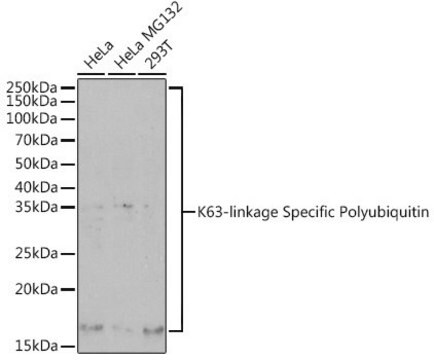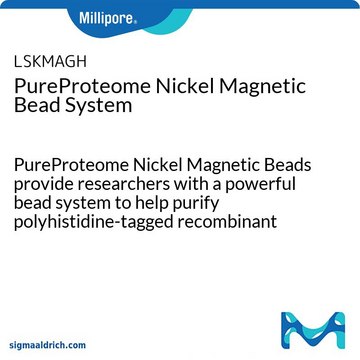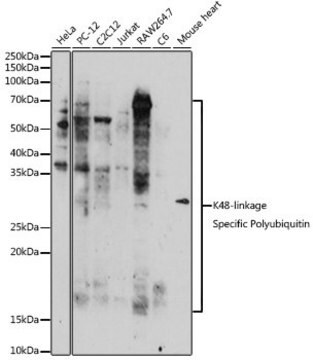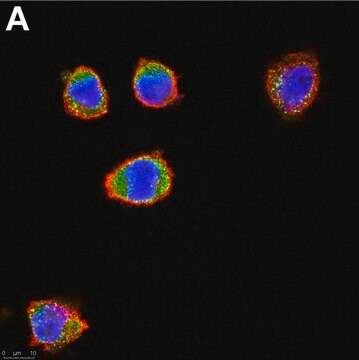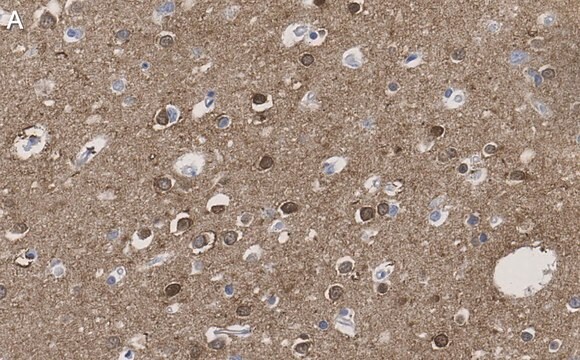推荐产品
生物源
mouse
品質等級
重組細胞
expressed in HEK 293 cells
共軛
unconjugated
抗體表格
purified antibody
抗體產品種類
primary antibodies
無性繁殖
HWA4C4, recombinant monoclonal
產品線
ZooMAb® learn more
形狀
lyophilized
純化經由
using protein G
物種活性
human
包裝
antibody small pack of 25 μL
環保替代產品特色
Waste Prevention
Designing Safer Chemicals
Design for Energy Efficiency
Learn more about the Principles of Green Chemistry.
加強驗證
recombinant expression
Learn more about Antibody Enhanced Validation
sustainability
Greener Alternative Product
技術
ELISA: suitable
affinity binding assay: suitable
western blot: suitable
同型
IgG2aλ
表位序列
N-terminal half
Protein ID登錄號
UniProt登錄號
環保替代類別
運輸包裝
ambient
儲存溫度
2-8°C
目標翻譯後修改
unmodified
基因資訊
human ... UBB(7314)
一般說明
We are committed to bringing you greener alternative products, which adhere to one or more of The 12 Principles of Green Chemistry.This antibody is Preservative-free, produced without the harm or sacrifice of animals and exceptionally stable to allow for ambient shipping and storage if needed and thus aligns with "Waste Prevention", "Designing Safer Chemicals" and "Design for Energy Efficiency". Click here for more information.
ZooMAb® antibodies represent an entirely new generation of recombinant monoclonal antibodies.Each ZooMAb® antibody is manufactured using our proprietary recombinant expression system, purified to homogeneity, and precisely dispensed to produce robust and highly reproducible lot-to-lot consistency. Only top-performing clones are released for use by researchers. Each antibody is validated for high specificity and affinity across multiple applications, including its most commonly used application. ZooMAb® antibodies are reliably available and ready to ship when you need them.
特異性
Clone HWA4C4 is a ZooMAb® Mouse recombinant monoclonal antibody that specifically detects Ubiquitin Lys 63 tagged proteins.
免疫原
A branched peptide corresponding to the Lys63 ubiquitination site. The C-terminus of Ubiquitin 71-76 peptide (RLRGG) was attached to the K63 in the Ubiquitin 58-63 peptide (CDYNIQKEST).
應用
Quality Control Testing
Evaluated by Western Blotting in lysate from HeLa cells treated with MG132.
Western Blotting Analysis (WB): A 1:1,000 dilution of this antibody detected Ubiquitin Lys63 in lysate from HeLa cells treated with MG132 (25 nM; 4 h), but not in untreated cells.
Tested applications
Western Blotting Analysis: A 1:1,000 dilution from a representative lot detected Ubiquitin Lys63 in Ubiquitin K63, Ubiquitin K11, and Ubiquitin K48.
Affinity Binding Assay: A representative lot of this antibody bound recombinant Ubiquitin-Lys63 with a KD of 5.2 x 10-6 in an affinity binding assay.
Enzyme Immunoassay Analysis (ELISA): A serial of dilutions from a representative lot detected recombinant Ubiquitin Lys63, but not Ubiquitin K11 or GST protein.
Note: Actual optimal working dilutions must be determined by end user as specimens, and experimental conditions may vary with the end user
Evaluated by Western Blotting in lysate from HeLa cells treated with MG132.
Western Blotting Analysis (WB): A 1:1,000 dilution of this antibody detected Ubiquitin Lys63 in lysate from HeLa cells treated with MG132 (25 nM; 4 h), but not in untreated cells.
Evaluated by Western Blotting in lysate from HeLa cells treated with MG132.
Western Blotting Analysis (WB): A 1:1,000 dilution of this antibody detected Ubiquitin Lys63 in lysate from HeLa cells treated with MG132 (25 nM; 4 h), but not in untreated cells.
Tested applications
Western Blotting Analysis: A 1:1,000 dilution from a representative lot detected Ubiquitin Lys63 in Ubiquitin K63, Ubiquitin K11, and Ubiquitin K48.
Affinity Binding Assay: A representative lot of this antibody bound recombinant Ubiquitin-Lys63 with a KD of 5.2 x 10-6 in an affinity binding assay.
Enzyme Immunoassay Analysis (ELISA): A serial of dilutions from a representative lot detected recombinant Ubiquitin Lys63, but not Ubiquitin K11 or GST protein.
Note: Actual optimal working dilutions must be determined by end user as specimens, and experimental conditions may vary with the end user
Evaluated by Western Blotting in lysate from HeLa cells treated with MG132.
Western Blotting Analysis (WB): A 1:1,000 dilution of this antibody detected Ubiquitin Lys63 in lysate from HeLa cells treated with MG132 (25 nM; 4 h), but not in untreated cells.
標靶描述
Ubiquitin (Ub) is initially produced as a 229 amino acids Polyubiquitin-B (UniProt: P0CG47) precursor protein encoded by the UBB gene (Gene ID: 7314) or a 685 amino acids Polyubiquitin-C precursor protein (UniProt: P0CG48) encoded by the UBC gene (Gene ID: 7316) in human. Ub exists either covalently attached to another protein, or free (unanchored). When covalently bound, it is conjugated to target proteins via an isopeptide bond either as a monomer (monoubiquitin), a polymer linked via different lysine residues of the ubiquitin (polyubiquitin chains) or a linear polymer linked via the initiator methionine (Met) of the ubiquitin (linear polyubiquitin chains). Ub is linked covalently via its carboxyl terminus (Gly76) to lysine residues in target proteins. In a given target lysine residue can be linked to one single Ub molecule (monoubiquitylated) or to a chain of Ub molecules (polyubiquitylated). In a polyUb chain, Ub molecules can be linked through one of the seven lysine residues (K6, K11, K27, K29, K33, K48, and K63). Polyubiquitin chains, when attached to a target protein, have different functions depending on the lysine residue of the ubiquitin that is linked. For example, lysine 6-linked may be involved in DNA repair; lysine 11-linked is involved in endoplasmic reticulum-associated degradation (ERAD) and in cell-cycle regulation, and lysine 29-linked is involved in lysosomal degradation. Lysine 48-linked chains mark proteins for proteasomal degradation, while lysine 63-linked chains are involved in endocytosis, DNA-damage responses, and in signaling leading to activation of the transcription factor NF-kB. Ubiquitin undergoes phosphorylation at the serine 57 by a ubiquitin kinase and this phosphorylation is an important modifier of ubiquitin function, particularly in response to proteotoxic stress. This phosphorylation may also be a deciding factor whether ubiquitin is recycled or degraded during multi-vesicular body sorting on endosomes. (Ref.: Hepowit, NL., et al (2020). eLife 9; e58155; Lee, S., et al. (2017) eLife. 6; e29176).
外觀
Purified recombinant mouse monoclonal antibody IgG, lyophilized in PBS, 5% Trehalose, normal appearance a coarse or translucent resin. The PBS/trehalose components in the ZooMAb formulation can have the appearance of a semi-solid (bead like gel) after lyophilization. This is a normal phenomenon. Please follow the recommended reconstitution procedure in the data sheet to dissolve the semi-solid, bead-like, gel-appearing material. The resulting antibody solution is completely stable and functional as proven by full functional testing. Contains no biocide or preservatives, such as azide, or any animal by-products. Larger pack sizes provided as multiples of 25 μL.
重構
300 μg/mL after reconstitution at 25 μL per vial. Please refer to guidance on suggested starting dilutions and/or titers per application and sample type.
儲存和穩定性
Recommend storage of lyophilized product at 2-8°C; Before reconstitution, micro-centrifuge vials briefly to spin down material to bottom of the vial; Reconstitute each vial by adding 25 μL of filtered lab grade water or PBS; Reconstituted antibodies can be stored at 2-8°C, or -20°C for long term storage. Avoid repeated freeze-thaws.
法律資訊
ZooMAb is a registered trademark of Merck KGaA, Darmstadt, Germany
免責聲明
Unless otherwise stated in our catalog or other company documentation accompanying the product(s), our products are intended for research use only and are not to be used for any other purpose, which includes but is not limited to, unauthorized commercial uses, in vitro diagnostic uses, ex vivo or in vivo therapeutic uses or any type of consumption or application to humans or animals.
未找到合适的产品?
试试我们的产品选型工具.
儲存類別代碼
11 - Combustible Solids
水污染物質分類(WGK)
WGK 1
閃點(°F)
Not applicable
閃點(°C)
Not applicable
我们的科学家团队拥有各种研究领域经验,包括生命科学、材料科学、化学合成、色谱、分析及许多其他领域.
联系技术服务部门


